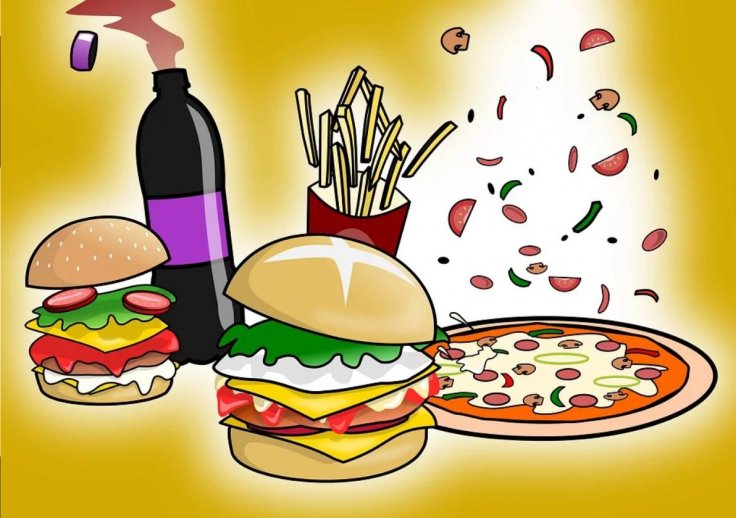We live in a time where sugar and fat-laden food is abundantly accessible and snacking at will at any part of the day is commonplace. However, this does more harm than just unhealthy weight gain says a new study. The researchers say that the brain's pleasure center releasing the pleasure chemical dopamine and the biological clock of the brain are linked—and that consumption of high-calorie foods hampers the normal feeding schedules—which leads to over-consumption. The final result? Obesity.
Employing mice study models, researchers from the University of Virginia were able to demonstrate that the availability of a high-fat diet around the clock led to anytime snacking and ultimately resulting in obesity and other related health concerns.
Pointing towards the changing dietary habits across the world, and the ills of easily available processed food, Ali Güler, co-author of the study, said in a statement, "Many of these foods are high in sugars, carbohydrates and calories, which makes for an unhealthy diet when consumed regularly over many years."
Pleasure hormone, snacking and the disruption of the brain's cycle
It is common knowledge that high-calorie foods trigger the pleasure center of the brain. As a result, the pleasure hormone, dopamine, is released. Over a period of time, the dependency on high-calorie food for a 'dopamine high' increases. Hence, people begin consuming more of it.
The brain has its own biological clock, or circadian rhythm, that regulates biological cycles such as sleep-patterns, and feeding schedules, among others. Through the study, the researchers posited that both the functions of the brain are related. Therefore, snacking on unhealthy food any time one wished, disrupts the brain cycle and leads to over-consumption of these foods, they suggest.

Mice learned to 'snack'
For the study, the researchers fed one group of mice with a wild diet—high fat and low carbohydrates—and maintained a regimented eating and exercise schedule. They found that these mice were able to sustain normal eating and exercise schedule and healthy body weight. Another group of mice was given a 24/7 high-calorie diet concentrated in fat and sugar. These mice began 'snacking' throughout the day and became obese.
In knockout mice—genetically modified mice in whom a particular gene associated with a function has been deactivated—in this case, the disruption of dopamine signaling prevented them from seeking the rewarding pleasures of a high-fat diet—displayed a normal schedule and averted obesity in spite of being presented with the 24/7 availability of high-calorie foods. "We've shown that dopamine signaling in the brain governs circadian biology and leads to consumption of energy-dense foods between meals and during odd hours," highlighted Güler.
The study also references other research which found that mice fed on high-fat foods or during what should is considered normal resting hours between meals, the additional calories consumed are stored as fat more easily than a similar number of calories consumed normally during fixed feeding periods

Times have changed but humans have not
Güler points out that the human has evolved over millions of years and is geared for a hunter-gatherer disposition. As the immediate abundance of food such as after a hunt lead us to eat as much as we can, followed by the non-availability of food for long spells. Also, human beings were prey to larger animals which led them to forage during the day and sleep at night for rest and safety.
Stressing on the absence of such historical pressures of uncertain availability of food on modern human beings, Güler said, "But, of course, food is now abundant, and our next meal is as close as the kitchen, or the nearest fast-food drive-through, or right here on our desk. Often, these foods are high in fats, sugars, and therefore calories, and that's why they taste good. "
Never lights out these days
Electricity has played a role in wreaking havoc on our circadian cycles adds Güler. Being engaged in mostly manual labor throughout the day and resting at sundown was the norm for the pre-electricity era. This led to the synchronization between human activity and the day-night cycle. However, the advent of electricity changed this.
Any activity is possible to carry out at any time of the day; eating, staying awake and recreation included. This affects the evolutionary programming of human beings Güler said. "This lights-on-all-the-time, eat-at-any-time lifestyle recasts eating patterns and affects how the body utilizes energy," added Güler.
Obesity extends beyond just unhealthy weight
The effects of obesity are not just confined to unhealthy weight adding strain on joints. Heart disease, cancer, diabetes and are on the rise, and it has been proven that obesity makes it worse. Studies suggest the obesity can be partly blamed for the offset of Alzheimer's disease. "Half of the diseases that affect humans are worsened by obesity. And this results in the need for more medical care and higher health care costs for individuals, and society," concludes Güler.
Numbers from the World Health Organisation (WHO) point towards a bleak picture as well. According to it, since 1975, worldwide obesity has nearly tripled. As of 2016, over 1.9 billion adults—18 years and above—were overweight. Out of which, over 650 million were obese. 13% of adults who were 18 years and above were obese in 2016, and 39% were overweight. The results of the study show that just an altered brain process is behind the global health crisis being faced in many developed countries.









